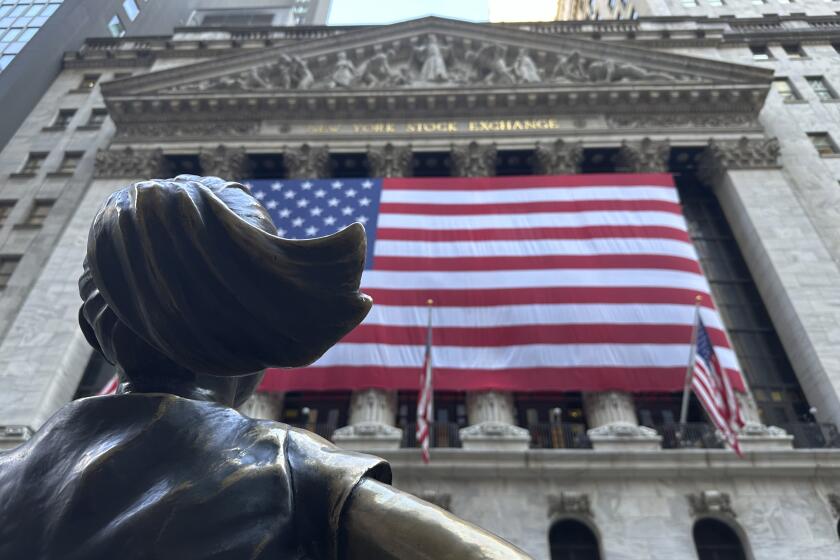Scandal Spurs Calls for Reform : Treasuries: Wrongdoing by Salomon Inc. strengthens argument for making the transactions in the $2.2-trillion market more public.
There’s nothing bigger than the $2.2-trillion market for U.S. Treasury securities, and that’s a problem.
Critics have argued for years that the Treasury market is too lightly regulated and that the 40 “primary dealer” brokerages and banks that dominate it operate too much as a private club.
The Salomon Inc. scandal is certain to spur new oversight of the Treasury market by Congress, which last visited this issue in 1986--after the failures of two government securities trading firms caused a run on 70 savings and loan institutions in Ohio.
Unlike the stock market, where prices largely are determined in open view either on exchange floors or via nationwide electronic systems, the daily buying and selling of Treasury securities have mostly been private telephone affairs among dealers, with little public “sunshine” on prices.
That has been the case despite the mammoth trading volume in Treasury securities--$115 billion a day in 1990 versus just $21 billion a day in corporate stock and bonds and $3 billion a day in municipal bonds, according to the Public Securities Assn.
“It’s very difficult for people who are not primary dealers to have good information about spreads and prices (on Treasuries),” Richard Breeden, chairman of the Securities and Exchange Commission, told the New York Times earlier this year.
The huge size of the Treasury market today stems from the government’s borrowing binge in the 1980s. There were $683 billion in tradable Treasury securities outstanding in 1981. Today, there are $2.2 trillion outstanding, from three-month bills to 30-year bonds. The money raised by Uncle Sam has been used to fund defense, social services and the myriad other government programs.
Because that debt is so large and because so many investors around the globe own a piece of it, it’s imperative that the Treasury market be extremely liquid--that is, buyers and sellers must be able to enter and exit the market quickly and easily. Otherwise, investors’ confidence in the security of their Treasury holdings could be shaken.
The primary dealer group of 40 brokerages and banks is supposed to ensure Treasury liquidity. The 40 firms, of which Salomon is a leader, must always stand ready to buy or sell Treasuries.
They also act as the major distributors of new Treasury securities to other brokerage houses, banks and other investors worldwide. Whenever the government sells new debt, the 40 primary dealers buy the bulk of it for resale to other investors.
However, the primary dealers don’t completely control the market. For example, individual investors can buy Treasury securities direct from the government when it sells new debt, bypassing the primary dealers altogether.
Also, the market itself ultimately determines the yields the government must pay on its debt. When the government decides to sell a new bond issue, for example, the primary dealers poll their large-investor customers to get a feel for the yields they’re willing to accept on the issue.
In some situations, investor sentiment can turn on a dime--and if the primary dealers have purchased Treasury bonds at one yield and their customers suddenly demand a higher yield, the dealers can lose money when they finally unload the bonds.
Still, the risk of losses to the dealers is offset by their potential to profit from warehousing and trading Treasuries. And there is no question that the dealers exercise enormous power in pricing the securities, in that they can influence their investors’ sentiment about bond yields either directly through investment advice or indirectly through trading tactics.
That pricing power means the dealers determine, in part, the cost of operating the federal government. In addition, because interest rates on Treasury securities affect other rates--such as on home mortgages--the dealers’ power over the economy is multiplied, and honesty in pricing and trading of Treasuries becomes that much more important.
Even before the Salomon scandal came to light, Congress had begun debate this summer on reauthorization of the Treasury Department’s ability to regulate its own securities market. That authority was given in 1986, under the Government Securities Act.
The GSA was enacted after the failure of two firms that were big traders (though not primary dealers) in government securities: ESM Government Securities of Ft. Lauderdale, Fla., and Bevill, Bresler & Schulman. ESM’s failure brought down some state-chartered Ohio savings institutions that had done business with the firm.
The GSA established, for the first time, a system for regulating government securities dealers and how they hold Treasuries for customers. However, some critics have long believed that the GSA didn’t go far enough because it didn’t establish rules for Treasury dealers’ sales and trading practices. The fear at the time was that too rigid a system of regulation would slow trading and thus threaten the crucial liquidity in the Treasury market.
But Congress is certain to focus on those trading practices now, in light of Salomon’s admitted attempt to virtually corner the market in some Treasury securities by hoarding them. Lawmakers will ask how the Treasury’s oversight failed to spot Salomon’s abuses.
One healthy development is that an electronic system for real-time Treasury security quotes among dealers was just launched this summer--an answer to the calls of SEC Chairman Breeden and others for more transparency in how Treasuries trade day to day. The system, GOVPX, is only in its infancy, but its ability to let any trader view on a screen the minute-by-minute price action in Treasuries is seen as a major step toward letting the sun shine on the Treasury dealer network.
RESIGNATIONS AHEAD: A1
Why Salomon Is So Important
The shock of the Salomon Inc. Treasury market scandal has shaken Wall Street to its foundations because Salomon is such an important part of so many markets:
* It is the oldest dealer in Treasury bonds, and its capital base of $4.42 billion--fourth-biggest of any brokerage--allows it to provide important liquidity to the market as an active buyer and seller.
* Salomon’s broker network does relatively little business with individuals. Instead, the firm is a major supplier of trading services, research and investment banking services to many of the world’s biggest companies and to national and local governments.
* Salomon’s Phibro Energy subsidiary is a leading global trader of crude oil, and its Phibro Refining unit is the fourth-largest independent oil refiner in the United States.
Transition Time at Salomon Bros.
Warren Edward Buffett, 60
* Entered Salomon Bros. as a member of its board, 1987
* Has well respected judgement on Wall Street
* Will try to appease upset customers and shareholders of Salomon
* Built his fortune largely through passive investments in undervalued companies.
* Made a major shift with his $700-million investment in convertible preferred stock in Salomon.
Career Highlights
1991: named temporary chairman, Salomon Bros.
1969-present: folded Buffett Partnership Ltd., became chairman of Berkshire Hathaway Inc.
1965: purchased Berkshire Hathaway, small Mass. textile manufacturer
1956-69: general partner Buffett Partnership Ltd.
1951-54: investment salesman Buffett-Falk & Co.
John H. Gutfreund, 61
* In April knew of security scandal but said nothing, according to Salomon Bros.
* Believed Salomon Bros. could not remain dominated by its old strength of trading but must also be comfortable with merchant banking, lending and investing in leveraged buyouts.
* Oversaw most trading activity at Salomon Bros.
* Is well known in New York social circles and on Wall Street
Career Highlights
1981-1991: chairman and chief executive, Salomon Bros.
1978-81: managing partner, Salomon Bros.
1966-78: member of executive committee, Salomon Bros.
1963-66: partner, Salomon Bros.
1962-63: syndicate manager, Salomon Bros.
1953-62: on municipal desk, Salomon Bros.
Where the Brokers Rank
Salomon Bros. is a small brokerage in terms of offices and employees, but it is a giant presence on Wall Street, as shown by its huge capital (net worth).
Capital Global Brokerage (billions) Offices Employees 1 Merrill Lynch & Co. $9.67 510 39,000 2 Shearson Lehman Bros. 5.41 427 33,326 3 Goldman Sachs Group 4.70 21 6,822 4 Salomon Bros. 4.42 17 4,520 5 Morgan Stanley Group 3.38 12 7,079 6 Paine Webber Group 1.55 267 12,746 7 First Boston Corp. 1.47 10 4,218 8 Dean Witter Reynolds 1.41 499 16,609 9 Bear Stearns Cos. 1.39 13 5,558 10 Prudential Securities 1.22 336 17,000
Data as of Jan. 1, 1991.
Source: Securities Industry Assn.
More to Read
Inside the business of entertainment
The Wide Shot brings you news, analysis and insights on everything from streaming wars to production — and what it all means for the future.
You may occasionally receive promotional content from the Los Angeles Times.






